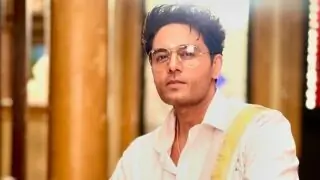From Rubina Dilaik's 17 hour shift to Kyrstle Dsouza's IV Drips: Inside the hectic lives of daily soap actors
Hindi TV actors endure hectic schedules, often working 14–17 hours daily with minimal breaks. Stars like Rubina Dilaik, Krystle D’Souza, and Juhi Parmar reveal exhaustion, fainting spells, and health struggles, sparking calls for humane working hours and better on-set support.
Published: Monday,Sep 15, 2025 07:22 AM GMT+05:30

Every evening, Hindi television beams into millions of homes, delivering endless hours of family drama, love triangles, betrayals and reunions. But behind the polished entertainment lies a less glamorous reality: a production model that demands endless output, forcing actors to work long shifts with little rest. Over the past year, some of the biggest names in the industry have spoken openly about the toll this system takes on their bodies, minds and personal lives.
Sleepless Shifts and Non-Stop Days:

Actor Rubina Dilaik, best known for Shakti-Astitva Ke Ehsaas Ki, has often raised her voice about the need for reform. Speaking to PTI, she said: “Having said that, I've been working for 17 hours. I’m not saying that the producer or the network should lose money. Everyone should get time to rest because their creativity will flourish”
For many veterans, such grinds were once routine. Juhi Parmar, who shot to fame with Kumkum, told TV Times: “We used to work 30 hours non-stop. There were so many days when people used to pack up, leave, come back the next day and I would still be shooting. People would change, the unit would change, but I would be working round the clock. There was no time limit and the pressure was too much.”
The pressure hasn’t eased for today’s younger stars. Ankit Gupta, last seen in Maati Se Bandhi Dor, shared with News18 shosha that he had been on a stretch of near-continuous work: “What we shot yesterday will be telecast today. What we’re shooting today will go on air tomorrow. It’s been more than 50 days, and nobody from our unit has taken a break. I’ve been shooting continuously for 45 days now. We’re all very tired. The entire unit is exhausted. We shoot for 14-15 hours every day. We don’t get enough sleep, and people are under pressure. It’s very difficult.”
Why They Continue?

Despite the punishing hours, many actors acknowledge that television offers something other mediums cannot: stability. Hiten Tejwani put it bluntly in an interview with the digital commentory: “If we calculate by say, for example, minimum Rs 7 lakhs for 30 days of shoot, then that makes it Rs 84 lakhs in a year. Plus there may be some ads or any other performances- like some dance perforce- then they will pay you a little extra. So it can go up to Rs 1 crore.''
For some, the grind doubles as a training ground. “Television is like a paid workshop. You learn to pick up lines quickly, adapt to changes, perform without endless rehearsals. Every actor should do TV once,” said Surbhi Jyoti in an interview with Indian Express.
Sharad Malhotra also drew comparisons with film and OTT in an interview: “A Bollywood actor works for a few months on a project. A TV actor plays the same role year-round, 11–12 hours a day, with no break. It is double the effort.”
The Push for Change:

Increasingly, stars are calling for reform. Rubina Dilaik has advocated for “respectful working hours”, while Priya Malik has demanded codified rest periods. Others point to the lack of basic facilities on sets, clean restrooms, nutritious meals, and medical support, conditions that would be unthinkable in film or OTT productions.
Still, producers argue that the economics of Indian television leave little room for change. Episodes are often written, shot, and telecast within 48 hours, making delays costly in terms of both TRPs and advertiser commitments. With dozens of channels competing for eyeballs, the daily soap model remains the industry’s survival mechanism, even if it comes at the expense of its stars’ wellbeing.
Behind the Glamour:

From 30-hour shifts to fainting spells on set, the stories of Juhi Parmar, Krystle D’Souza, Rubina Dilaik and many others show that the dazzling world of Hindi television rests on relentless human effort. For millions of viewers, these actors are familiar faces who arrive in their homes every evening without fail. But for the actors themselves, that consistency often means sacrificing sleep, health, and personal time.
As Rubina put it: “Respectful working hours are not a luxury, they are a necessity.” Whether the industry can balance its breakneck pace with the wellbeing of its stars is a question that still remains unanswered.
The Physical and Mental Toll:

The demands of daily soaps often come with heavy health costs. Krystle D’Souza recalled collapsing on set due to overwork: ''There were no rules or governing bodies back then that established that you could only shoot for 12 hours. I have shot for 60 hours non-stop. I have fainted on the sets so many times. There was no time even to go to the hospital, they would bring the hospital on set. It was taking a toll on me; I was not able to keep up anyway,'' the actresss told Siddharth Kanan & revealed being on IV drips too.
Comedian and host Bharti Singh highlighted just how far the industry pushes its talent. On her podcast with Harsh Limbachiyaa in April 2024, she revealed: “I have seen women shooting with drips in their hands. Directors have collapsed with heart attacks. There is no concept of rest — the telecast must go on.”
Actor Priya Malik, who appeared in Nazar, spoke about the lack of breaks. “There should be a mandatory break every week or at least after 10 days. We are not machines. Fifty-five days without a single day off is inhuman.”
Join Our WhatsApp Channel
Stay updated with the latest news, gossip, and hot discussions. Be a part of our WhatsApp family now!
Join NowYour reaction
 Nice
Nice Great
Great Loved
Loved LOL
LOL OMG
OMG Cry
Cry Fail
Fail




















Post a comment